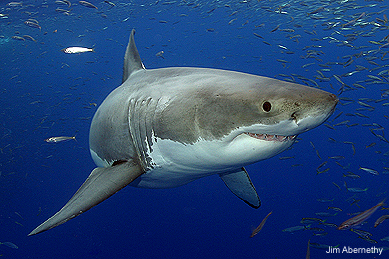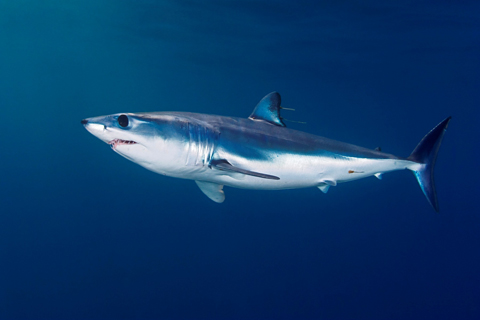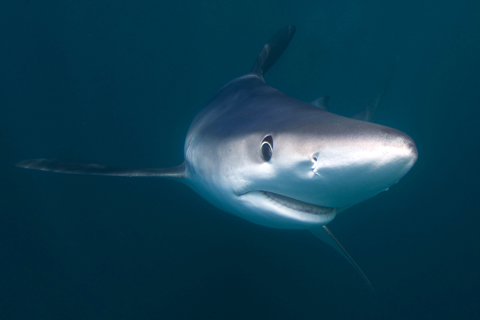Navigation
Chile Ban on Shark Finning Law Published: Praised by Pew
Matt Rand, director of global shark conservation for the Pew Environment Group, issued the following statement on August 8, 2011 in response to Chilean President Sebastián Piñera’s signing of Chile’s ban on shark finning.
 |
| Great white shark taken off of the coast of Mexico near Guadalupe. Photograph by Jim Abernethy courtesy of Pew |
Matt Rand, director of global shark conservation for the Pew Environment Group, issued the following statement on August 8, 2011 in response to Chilean President Sebastián Piñera’s signing of Chile’s ban on shark finning. This new regulation requires that any fisherman who catches these animals must land them with their fins naturally attached, meaning that the whole body must be taken to port intact. The law was published on August 8, 2011 in the Diario Oficial.
 |
| Shortfin mako. This photograph was taken off of San Diego, California by Masa Ushioda. Photograph courtesy of Sea Pics |
“Through its new law to ban shark finning, Chile has become a leader in the conservation of some of the ocean’s most important and imperiled species. Up to 73 million sharks are killed every year around the globe primarily for their fins, which are most often consumed in Asia in shark fin soup. This unsustainable trade is fueled by shark finning, the wasteful act of slicing off the fins and discarding the body at sea.
“Accompanying the ban is a pledge from the fisheries undersecretary, Pablo Galilea, to end the Chilean fleet’s use of wire leaders in longline fishing gear, which will help to reduce the large number of sharks caught by fishermen seeking swordfish or tuna. While these valuable fish cannot chew through alternative gear, such as monofilament leaders, sharks can—and, when they do, they swim free.
 |
| Blue shark. This photograph was taken off of Narragansett, Rhode Island by Karin Leonard. Photograph courtesy of the Marine Photobank |
“An estimated 53 species of sharks are found in Chilean waters. These two measures will help to keep that diversity in the sea and out of the fin market. We look forward to continuing our work with the Chilean government to safeguard threatened species and establish protected areas that are important for sharks and other marine life.”
“The United States banned shark finning earlier this year and since then the Marshall Islands and the U.S. territories of Guam and the Northern Marianas Islands have enacted bans on the possession, sale or distribution of shark fins,” The Pew Environment Group said on 8 August 2011. “And just within the last month, the Bahamas and Honduras created shark sanctuaries, where shark fishing is prohibited. Those countries joined Palau and the Maldives, which have passed laws based on their realization that live sharks for tourism can generate more money than dead ones.”
This news is from the Pew Environment Group of the Pew Charitable Trusts.
For the Spanish version of this news click here. PDF
This news is also presesnted on Horizon International's coral reefs and oceans website, Magic Porthole at www.coralreefs.co and www.magicporthole.org
Pew: Sharks in Trouble
This year has seen major shark conservation actions taken around the world, but more action is needed by many more countries. This video, a companion to a report by the Pew Environment Group, illustrates how these animals are threatened by commercial fisheries throughout the world's oceans. It points out that, according to global reports, shark populations have declined by as much as 70 to 80 percent. Scientists estimate that 30 percent of all shark species are threatened or near-threatened with extinction. For more information please visit: pewenvironment.org/sharks
Pew: Chile Bans Shark Finning
This new law requires that fishermen who catch sharks, intentionally or as by-catch, must land them with their fins naturally attached. Up to 73 million sharks are killed every year around the globe primarily for their fins, which are most often consumed in Asia in shark fin soup. This unsustainable trade is fueled by shark finning, the wasteful act of slicing off the fins and discarding the body at sea. For more information please visit pewenvironment.org/sharks
Search
Latest articles
Agriculture
- World Water Week: Healthy ecosystems essential to human health: from coronavirus to malnutrition Online session Wednesday 24 August 17:00-18:20
- World Water Week: Healthy ecosystems essential to human health: from coronavirus to malnutrition Online session Wednesday 24 August 17:00-18:20
Air Pollution
- "Water and Sanitation-Related Diseases and the Changing Environment: Challenges, Interventions, and Preventive Measures" Volume 2 Is Now Available
- Global Innovation Exchange Co-Created by Horizon International, USAID, Bill and Melinda Gates Foundation and Others
Biodiversity
- It is time for international mobilization against climate change
- World Water Week: Healthy ecosystems essential to human health: from coronavirus to malnutrition Online session Wednesday 24 August 17:00-18:20
Desertification
- World Water Week: Healthy ecosystems essential to human health: from coronavirus to malnutrition Online session Wednesday 24 August 17:00-18:20
- UN Food Systems Summit Receives Over 1,200 Ideas to Help Meet Sustainable Development Goals
Endangered Species
- Mangrove Action Project Collaborates to Restore and Preserve Mangrove Ecosystems
- Coral Research in Palau offers a “Glimmer of Hope”
Energy
- Global Innovation Exchange Co-Created by Horizon International, USAID, Bill and Melinda Gates Foundation and Others
- Wildlife Preservation in Southeast Nova Scotia
Exhibits
- Global Innovation Exchange Co-Created by Horizon International, USAID, Bill and Melinda Gates Foundation and Others
- Coral Reefs
Forests
- NASA Satellites Reveal Major Shifts in Global Freshwater Updated June 2020
- Global Innovation Exchange Co-Created by Horizon International, USAID, Bill and Melinda Gates Foundation and Others
Global Climate Change
- It is time for international mobilization against climate change
- It is time for international mobilization against climate change
Global Health
- World Water Week: Healthy ecosystems essential to human health: from coronavirus to malnutrition Online session Wednesday 24 August 17:00-18:20
- More than 400 schoolgirls, family and teachers rescued from Afghanistan by small coalition
Industry
- "Water and Sanitation-Related Diseases and the Changing Environment: Challenges, Interventions, and Preventive Measures" Volume 2 Is Now Available
- Global Innovation Exchange Co-Created by Horizon International, USAID, Bill and Melinda Gates Foundation and Others
Natural Disaster Relief
- STOP ATTACKS ON HEALTH CARE IN UKRAINE
- Global Innovation Exchange Co-Created by Horizon International, USAID, Bill and Melinda Gates Foundation and Others
News and Special Reports
- World Water Week: Healthy ecosystems essential to human health: from coronavirus to malnutrition Online session Wednesday 24 August 17:00-18:20
- STOP ATTACKS ON HEALTH CARE IN UKRAINE
Oceans, Coral Reefs
- World Water Week: Healthy ecosystems essential to human health: from coronavirus to malnutrition Online session Wednesday 24 August 17:00-18:20
- Mangrove Action Project Collaborates to Restore and Preserve Mangrove Ecosystems
Pollution
- Zakaria Ouedraogo of Burkina Faso Produces Film “Nzoue Fiyen: Water Not Drinkable”
- "Water and Sanitation-Related Diseases and the Changing Environment: Challenges, Interventions, and Preventive Measures" Volume 2 Is Now Available
Population
- "Water and Sanitation-Related Diseases and the Changing Environment: Challenges, Interventions, and Preventive Measures" Volume 2 Is Now Available
- "Water and Sanitation-Related Diseases and the Changing Environment: Challenges, Interventions, and Preventive Measures" Volume 2 Is Now Available
Public Health
- Honouring the visionary behind India’s sanitation revolution
- Honouring the visionary behind India’s sanitation revolution
Rivers
- World Water Week: Healthy ecosystems essential to human health: from coronavirus to malnutrition Online session Wednesday 24 August 17:00-18:20
- Mangrove Action Project Collaborates to Restore and Preserve Mangrove Ecosystems
Sanitation
- Honouring the visionary behind India’s sanitation revolution
- Honouring the visionary behind India’s sanitation revolution
Toxic Chemicals
- "Water and Sanitation-Related Diseases and the Changing Environment: Challenges, Interventions, and Preventive Measures" Volume 2 Is Now Available
- Actions to Prevent Polluted Drinking Water in the United States
Transportation
- "Water and Sanitation-Related Diseases and the Changing Environment: Challenges, Interventions, and Preventive Measures" Volume 2 Is Now Available
- Urbanization Provides Opportunities for Transition to a Green Economy, Says New Report
Waste Management
- Honouring the visionary behind India’s sanitation revolution
- Honouring the visionary behind India’s sanitation revolution
Water
- Honouring the visionary behind India’s sanitation revolution
- Honouring the visionary behind India’s sanitation revolution
Water and Sanitation
- Honouring the visionary behind India’s sanitation revolution
- Honouring the visionary behind India’s sanitation revolution

